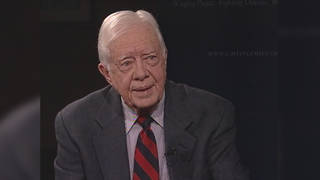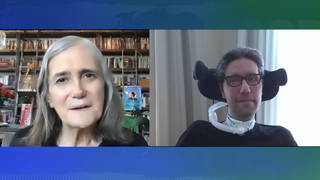
Related
Guests
- Ryan Grimsenior congressional correspondent for the Huffington Post. He is author of This is Your Country on Drugs: The Secret History of Getting High in America.
Democrats say the McCarran-Ferguson Act of 1945 has granted the insurance industry a captive market with no curbs on price fixing and other anti-competitive practices. Last week the Justice Department’s top antitrust regulator, Christine Varney, voiced support for a repeal. Senate Majority Leader Harry Reid and House Speaker Nancy Pelosi are also backing a repeal, and New York Senator Charles Schumer has called for including it as part of the healthcare reform bill. The House Judiciary Committee plans to vote on the issue on Wednesday. [includes rush transcript]
Transcript
SHARIF ABDEL KOUDDOUS: We begin with a new battle that’s emerged out of the Democratic-led efforts for healthcare reform. Support is growing on Capitol Hill to repeal a law that exempts the health insurance industry from antitrust laws. Democrats say the McCarran-Ferguson Act of 1945 has granted the insurance industry a captive market with no curbs on price fixing and other anti-competitive practices. Last week, the Justice Department’s top antitrust regulator, Christine Varney, voiced support for a repeal. Senate Majority Leader Harry Reid and House Speaker Nancy Pelosi are also backing a repeal, and New York Senator Charles Schumer has called for including it as part of the healthcare reform bill. The House Judiciary Committee plans to vote on the issue on Wednesday.
In his weekly radio address, President Obama backed congressional scrutiny of the law.
PRESIDENT BARACK OBAMA: The fact is, the insurance industry is making this last-ditch effort to stop reform even as costs continue to rise and our healthcare dollars continue to be poured into their profits, bonuses and administrative costs that do nothing to make us healthy — that often actually go toward figuring out how to avoid covering people. And they’re earning these profits and bonuses while enjoying a privileged exception from our antitrust laws, a matter that Congress is rightfully reviewing.
AMY GOODMAN: For more on this story, we’re joined from Washington, DC by Ryan Grim. He’s the senior congressional correspondent for the Huffington Post.
Welcome, Ryan, to Democracy Now! Can you just lay out what is being proposed here?
RYAN GRIM: Sure. Right now, the insurance industry is one of the only businesses that gets antitrust protection from the federal government. It’s basically them, Major League Baseball and National Football. It’s kind of an accident of history. In 1944, the Supreme Court ruled that the federal government could regulate insurance industries, and immediately Congress stepped in and said, “Well, we’re not going to do it.” So, what they’ve been able to do is set up these near monopolies throughout the United States.
The Department of Justice estimates that I think in 94 percent of the country, there is a — what they call a highly concentrated market, which means that it’s in danger of becoming a monopoly or it has already tipped over into a monopoly, and that allows insurers to collude legally with hospitals and with doctors and other providers to set prices. They set high prices that they pay to the hospitals, then they can raise premiums. And without any competition, there’s nothing that anybody can do about it, and it’s perfectly legal.
SHARIF ABDEL KOUDDOUS: And why now is the support growing on Capitol Hill to repeal the law?
RYAN GRIM: It’s payback, pure and simple. There’s been a kind of truce that the Democrats have had with the insurance industry: you know, you guys don’t come out here with your Harry and Louise ads and just burn the town down, and we’ll give you, you know, 47 million new customers. But when the insurance industry, about two weeks ago, came out with a report that was very critical of reform, it was seen by the Obama administration and Democrats on the Hill as a declaration of war, so Democrats came back with what is their biggest weapon, probably, to shoot back at the insurance industry.
It’s strange that it took them so long to come up with this, because if choice and competition, the mantra that you always hear from Obama, is really the thing that you want here, then revoking the antitrust exemption —- protection is the first thing that you’d want to do, after the public option, of course.
SHARIF ABDEL KOUDDOUS: And shouldn’t this have been part of healthcare reform legislation in any case? Why is it only coming as retaliation for the health insurance industry’s report a couple weeks ago?
RYAN GRIM: It’s kind of a nuclear issue. And so, if Democrats would have brought it up in the very beginning and made it part of the early bill, then the health insurance industry would have come guns blazing at healthcare reform. And the Obama strategy from the very beginning was to try to at least neuter, if not win over, the major healthcare players. That’s why they cut the big deals with PhRMA, with the medical device makers, with the hospitals. They cut another deal with doctors today about their Medicare cuts. So they’ve been trying to keep everybody at the table so that they won’t blow up the process. And they feared that if they revoked this exemption early in the process, that the health insurance industry would try to blow it up, and maybe they would see it implode over August, and we wouldn’t even be talking about healthcare anymore. That was their strategy, at least. Whether that’s right or not, nobody knows. But now that they’ve come into open war, you know, everything’s on the table.
AMY GOODMAN: Despite Obama’s comments in his radio address, the White House has refused to guarantee the President will back the repeal if it gets congressional approval. One day after Obama’s address, White House adviser David Axelrod was interviewed by George Stephanopoulos on ABC’s This Week.
GEORGE STEPHANOPOULOS: The insurance industry for the last sixty years has had an antitrust exemption. Was he saying that he would sign a bill that would take that away and open the door to premium caps by the Congress?
DAVID AXELROD: Well, Congress is reviewing that. He said it’s appropriate that they review that. But let’s talk about -—
GEORGE STEPHANOPOULOS: Would he sign it, though?
DAVID AXELROD: Let’s talk about the insurance industry for a second, because most of the stakeholders in this healthcare debate are at the table. They’re trying to produce real reform, because everyone knows the current system is unsustainable. The insurance industry has decided now at the eleventh hour that they don’t want to go along with this. One of the problems we have is we have a healthcare system now that functions very well for the insurance industry, but not well for their customers. So what we need —-
GEORGE STEPHANOPOULOS: So is he saying if they don’t play ball, they’re going to lose their antitrust exemption?
DAVID AXELROD: —- what we — so we need these — we need these reforms. In the last year — in the last ten years, premiums have doubled. You’ve seen the insurance companies take — ten years ago, fifteen years ago, they spent 95 percent of their premiums on healthcare, now 80 percent. More of the money is going to bonuses, salaries, administrative costs. This is not a sustainable path for this country. So we need reform, and that’s what he is arguing for.
GEORGE STEPHANOPOULOS: But if they don’t join the reform effort, will they the lose their antitrust exemption?
DAVID AXELROD: Well, we’ll see what Congress — we’ll see what Congress does. One thing we ought to do, the House bill has in it provisions that says that if they fall below a certain level of return of these medical-loss ratios, in other words, the amount of money that they spend on actual healthcare, that they need to rebate some of that money to consumers. That seems like a good idea.
AMY GOODMAN: That’s David Axelrod on ABC with George Stephanopoulos. Ryan Grim, do you think the repeal would actually happen?
RYAN GRIM: You know, it might. As Axelrod clearly stated there, it’s a nakedly political move that they’re making. And as this battle intensifies, if the insurance company ramps it up and Democrats are able to keep going forward, then they might just do it.
You know, you’re not going to hear it from the White House, because their strategy all along has been to refuse to say what they want. And their support among liberals and progressives in that Washington Post poll that you mentioned is dropping, in terms of how strong Obama is being on healthcare, because he refuses to say what he wants, and people up on Capitol Hill are getting frustrated. They’re saying, “Look, it’s been months now. Start demanding something. You know, tell us you want a public option. Not only do you want it, but you’re going to demand it. Tell us you want this exemption through. Not only do you want it, but you’re going to demand it.”
So it’ll be interesting to look to the White House over the next couple weeks to see if they do step up their rhetoric and realize that they might actually win.
AMY GOODMAN: And Ryan, this latest poll that just came out, the Washington Post-ABC News poll, has found 57 percent of all Americans want a public insurance option.
RYAN GRIM: Sure. And what’s amazing is that we’re now in the Senate talking about what kind of public option might be in the final bill, rather than whether or not we’re going to have a public option. That is just an extraordinary political achievement for the left over the last six months. Max Baucus just said the other day that there might be a, quote, “less pure public option.” Harkin said that there would be a public option in the final bill. Dodd and Harry Reid, who are in the room writing this final bill, have both said that they support a public option. It’s astounding to a lot of centrists and mainstream reporters and politicians that this is where the debate is. But something has changed out there, and there’s a very real possibility that the final package will include a real public option.
AMY GOODMAN: And the split between Harry Reid and Charles Schumer of New York, with Schumer saying Reid just has to put it in. Reid, actually facing a very serious challenge at home, could actually lose the next Senate race? And maybe —-
RYAN GRIM: Yeah.
AMY GOODMAN: —- Schumer would run for his position?
RYAN GRIM: Well, Reid — Schumer might. You know, he does seem like a natural majority leader. But Reid has been kind of all over the place on this. A couple weeks ago at a telephone town hall with constituents in Nevada, he said, you know, something like “I guarantee that we will have a public option in the bill that goes to the President’s desk.” That night I had a — Democratic advisers calling, saying, “Whoa, whoa, you know, he didn’t quite mean that. He said he wants to, you know, have choice and competition,” the Obama terms. So part of Harry Reid really wants to go to battle and get this done; the other part of him is, you know, hedging a little bit. So, you know, it’ll be up to the left and progressives over the next month or so to really put pressure on Harry Reid to do what it seems like he does want to do.
SHARIF ABDEL KOUDDOUS: And Ryan Grim, on another topic, you’re also the author of the book This Is Your Country on Drugs: The Secret History of Getting High in America. We just had the news of the Justice Department issuing new guidelines for federal prosecutors not to pursue cases against medical marijuana patients. What are your thoughts on the significance of this? And explain the ambiguity between state and federal law in this case.
RYAN GRIM: Well, federal law says that the US government can, if it wants, apply its anti-marijuana laws anywhere in the country, regardless of state laws, but that states are still allowed to pass whatever laws they want to, independent of the federal law. So if you’re a medical marijuana patient in California, you’re protected from the local police, and you’re protected from the state police, but you’re not protected from the DEA. What this policy does is formalize a decision that they had announced during the campaign and then announced again in March of earlier this year that says that if you’re following a state law, and your state law allows you to use medical marijuana or be a caregiver for it, then the DEA won’t mess with you.
Now, you have to be very careful, because the DEA over the last several months has been raiding joints out in California and other places, saying that there are state tax violations or, you know, any other kind of very marginal type of discrepancy between state law and what these businesses are doing. So now the DEA is getting, you know, into the business of enforcing very small state laws. So if you own a medical marijuana shop in California, you better make sure all your parking tickets are paid, basically.
And this just goes back to the kind of, you know, schizophrenic relationship that this country has always had with drugs, and I write about it in the book, going back 200 years, 300, 400, even back to the founders. You know, we have this insatiable desire to alter our consciousness, and at the same time we have this need to control the behavior of other people. And it’s something that’s been in conflict, and it always will, and this is kind of the result of it, although this is a wave of a more libertarian and more liberal kind of philosophy.
SHARIF ABDEL KOUDDOUS: And finally, Senator Richard Durbin introduced a bill on Thursday that would eliminate the disparity in sentencing between crimes of — crimes convicted of cocaine or crack. Can you respond to that?
RYAN GRIM: It’s astounding that we even have to talk about something like this. This is one of the legacies of the ’80s, where if you’re caught with five grams of crack cocaine, you get the same penalty as if you’re caught with 500 grams of powder cocaine. You know, and it’s obvious who the users of powder cocaine are compared with who the users are of crack cocaine. It’s one of the most racist laws that we have on the books today.
And it says something that, finally, Democrats are at least addressing it. I think a lot of it has to do with actually the reduction in the crime rate over the last ten years or so, which has given Democrats a little bit of window to start speaking up on civil rights again and not be afraid of being accused of soft on crime or soft on drugs.
There was a, you know, very dark period for this country in the ’80s on drug policy, and as a result, we went from around 500,000 prisoners to over two million. You know, we lead the world in locking people up. And we also lead the world in drug use. So, clearly, something is not working.
AMY GOODMAN: Ryan Grim, we want to thank you very much for being with us, senior correspondent for the Huffington Post. His book is This Is Your Country on Drugs: The Secret History of Getting High in America.













Media Options